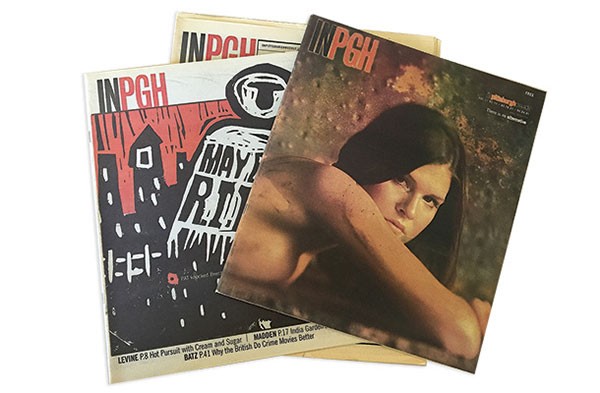Every so often, Jim Lavrinc, City Paper’s circulation director, pops by my desk with a random issue or piece of stationery or, as was the case the day I sat down to write this, a roll of old address labels from the long-defunct In Pittsburgh Newsweekly.
I’ve been a little nostalgic for the old paper recently. Partly because of the artifacts and partly because I knew that this month would mark 15 years since the city’s dominant alt weekly was bought out by City Paper’s former owners, Steel City Media. Since this is CP’s 25th anniversary, I knew I wanted to take some time and remember IP and my time there. Why? For the sake of history I guess. The paper was as important a part of my life then as this paper is now; plus, it’s hard to talk about the history of one of these papers without discussing the other. Also, given the state of our industry locally and nationwide, it’s sometimes hard not to look back at your failures and wonder whether things could have turned out differently.
In Pittsburgh was well past its prime when I joined the staff in spring 2000. I was a straight-news daily reporter at the time, covering state and federal courts in south Louisiana and dabbling in the occasional long-term investigative piece. I remember the day I started, I was shown to my desk: an old, heavy, metal desk sitting in a third-floor hallway at the top of the stairs, jammed against an emergency exit. We were on East Carson Street, across from Smokin’ Joe’s Saloon.
Now, to be fair, the offices were probably shitty long before the end-times came. I was just excited and nervous to be entering the world of alt media at Pittsburgh’s premier news and arts weekly. Well, that’s what they told me at the interview, anyway. There was a time, of course, when IP was the king of the hill. The paper opened its doors in 1985 and by the time CP came along, in November 1991, it was a force in local media. But, like a lot of things, that changed and in the late 1990s, City Paper was the dominant force — thanks to the influx of many In Pittsburgh-ers who either left or were fired once IP was purchased by Review Publishing out of Philadelphia.
I learned about all of this history, of course, after coming to Pittsburgh. But even though we were No. 2 in a two-person race, I still loved it there. And to be sure, I loved the world of alt weeklies. Like many youngsters breaking into the medium, I got a little carried away with the freedom to write curse words in my stories. I was trying to infuse “fucks” and “shits” into everything I wrote, from city-council stories to dining reviews. I even used the word “dildo” once in a sports column about double-headers. Admittedly, I was out of control early on, but I found a nice rhythm and before long, we were really doing great work. Unfortunately, we would be the last staff of In Pittsburgh.
By early 2001, there were whispers that things at IP were not great. Readers were disenchanted by the out-of-town owners and they were now following the writers they knew at CP. In May, myself and the other staff writer were told that our jobs were nearly axed, but saved at the last minute. It was strongly suggested that if we had other opportunities, we should take them. By the end of July, I had moved on to a dreadful job as the managing editor of my hometown paper, getting screamed at by locals for my use of giant headlines and photos. Six months earlier, I had written the word “dildo” in a story, and by Thanksgiving 2001 I had a letter placed into my personnel file warning me about my careless and gratuitous use of the word “fart.”
And, as I mentioned at the top of this story, IP was sold to City Paper in September 2001. Several of those staffers came to work here, and I would find my way in the door in 2005 before becoming editor two years ago.
Maybe I’ve been feeling nostalgic about In Pittsburgh recently partially because of the state of the newspaper industry in this town. The Pittsburgh Post-Gazette and Pittsburgh Tribune-Review are offering buyouts to employees; rumors swirl daily about newsrooms shutting down; and daily there’s a new competitor trying to cut into what you’re doing, only this time, they’re coming via the internet instead of the newspaper box beside yours. But I don’t have that feeling of dread today like I did back then. Looking back honestly, IP had relied too heavily on its reputation, rather than on moving forward and building a sustainable business model. The staff was still producing quality content on a weekly basis, but despite a strong, talented staff, ownership didn't know how to adapt; it didn't know how to survive, so it didn't.
I loved working at In Pittsburgh and am very proud of my time there; it made me realize that alt weeklies were the place for me. But, in a way, I’m glad to have been there at the time of its demise. The landscape for media companies has been changing for years now, and we’ve done a lot, especially in the past two years, to not only keep up, but also move ahead of the competition. After all, those who don’t learn from history are doomed to be written up for using the word “fart.”
Editor's Note: Changes were made to this version to clarify and state adamantly that in the writer's opinion, ownership of In Pittsburgh had fallen back on the paper's reputation instead of investing in the product for future growth and the changing newspaper industry.


